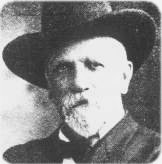Random Ramblings from a Republican
Saturday, May 29, 2004
Rossa's Recollections
1838-1898
Chapter XiX

I had been for five or six years previously in correspondence with Professor Eugene O'Curry. I had a long talk with them. John O'Donovan asked me to tea next night at his home, No. 136 North Buckingham Street; "and you" said he to O'Curry, "you try and come up." "No", said O'Curry, "but let Rossa come to my house the night after." I told him I would not be in Dublin the night after, as I should leave for home. O'Curry was a big stout man over six feet tall. O'Donovan was a small man. Those two men were dead, one year after that day I was speaking to them. They were married to two sisters of the name of Broughton - "of Cromwellian descent," as John O'Donovan says to me in one of his letters wherein he speaks of the mother of his seven sons - Mary Anne Broughton.
I went to John O'Donovan's house that evening, and met there Father Meehan, the author of that book called "The Confederation of Kilkenny." We talked of Fenianism, or of the cause for which I had been lately in Cork Jail. I, as well as I could, justified my belonging to that cause - not that my host or the priest said anything in condemnation of the cause - but I was surprised when I heard John O'Donovan say in the priest's presence - "the priests won't let the people fight." The priest said nothing.
About twelve o'clock a coach came to take him home. I went in the coach with him, and he let me down at my hotel in Lower Bridge Street. His chapel in the parish of Sts. Michael and John is near that street. I had been at John O'Donovan's house on some other occasions on which I visited Dublin before this time of the McManus funeral. The seven sons would be around us He would send John and Edmond to the library to bring some rare Irish books to show me. "Are those boys studying Irish language?" said I. "No", he said. I cannot get them to care anything about it, though they are smart enough at Greek and Latin." I fear that my early acquaintanceship with those boys had something to do with disturbing the serenity of their lives in after years; because when I came to live in Dublin in 1863, I used to visit their house, and they used to come to the Irish People office to see me. They got initiated into the IRB movement,a nd got into prison the time of the arrests. John, the eldest was drowned in St. Louis; Edmond, the second, the famed war correspondent, was lost in Asia or Africa; and I saw William, the third son, buried in Cavalry Cemetery, New York.
I have among my papers twenty or thirty of the letters of John O'Donovan, that I received from him between the years of 1853 and 1863. They are among my old papers. I cannot get them now. I may get them before I put these Recollections in book form. If I do, I will print a few of them in the book. One letter in particular has some passages in it that I cannot thoroughly understand. It speaks of the Irish people and the Irish cause; of Daniel O'Connell and of Doctor Doyle, and it says:
"There have been no two Irishmen of this century that despised the Irish race and the Irish character more than did Daniel O'Connell and the late Doctor Doyle, bishop of Kildare and Leighlin. Doctor Miley, in whose hands O'Connell died, told me this at this table, and I firmly believe it."
Now, the puzzle to me is: Why was that so? Why did they despise the Irish race and Irish character? I make many guesses at answering the question, and the only answer reasonable to myself, that I can get, is, that the Irish people made it a sin to themselves to do anything that could be done in the way of striking down English rule, and striking down everything and every one that belonged to English rule in Ireland.
*More of Rossa's Recollections tomorrow


